Whose Deal is It Anyway?
Inspired by Lessons of the Cards
Healthcare professionals, who have been in their careers for any length of time, certainly recognize the perpetual change of rules. We have become familiar with the mantra: “What is old is new and what is new is old!” The very cyclical nature of change becomes confusing.
Whose Deal is It Anyway?
Multifold change patterns have often been linked to employee fatigue, burn-out, and even medical error. Healthcare professionals are doing more and more complex processes. We’re accountable to ever-increasing waves of requirements, regulations, and reports. And, we’re subjected to never-ending scrutiny, yet are told that we must become the most efficient, kind, long-suffering workforce in the history of healthcare.
Once, simply being a nurse or a doctor ensured a mantle of respect and a cloak of trust. Now, we are told that our guests, a.k.a. patients, expect world-class treatment. Consultants tell us that our patients and clients are comparing us to Ritz-Carlton, Nordstrom, and Disney! Yet there is a vast dichotomy between my expectations of going to Disneyland for a few days and what I expect when I’m in dire need of healthcare. First, I really want to go to Disney. Second, I really do not want to go to the hospital.
When folks need hospitalization they are frightened, riddled with anxiety, and likely in severe pain. Our patients are longing for empathy, understanding, and symptom relief. Our staff is needing to be effective and efficient. We must work hard and fast. The dilemma is compounded because hospital beds are already filled with very sick patients; throughput stops. Emergency departments end up “holding” patients for days, just waiting for an open inpatient bed. Emergency gurneys are uncomfortable, curtains become walls, privacy and rest are non-existent. This certainly does not create a feeling of hospitality.
Yet, hospitals are held hostage with patient satisfaction scores. Like other service-sector satisfaction scores, an “always” is the only mark that matters. The scores are tied to reimbursement levels from payors, especially Medicare and Medicaid. Hospitals are struggling to enhance patient satisfaction scores. Currently, they are using a variety of strategies from the banking, hotel, and restaurant industries. Patient satisfaction scores reflect personal perceptions of kindness and caring. When healthcare providers are empathetic, listen attentively, and are genuinely “nice;” scores improve.
We truly want to excel in providing the best possible care, in a manner that supports the safety and trust of our patients and their families. In addition, we want to honor our employer and follow regulations. But it seems the more we hurry, the more we tighten productivity, the more we script our words; the less time we have for that which caused most of us to join our profession in the first place—to be present in a substantive way for our patients. Bottom line—making a difference!
This dilemma isn’t entirely new for the healthcare team. Yet in this age of assessing, measuring, documenting, planning, implementing, and keeping up with evidence-based standards—the ability to spend time with our patients, hear their laments, be in service or in the present moment with them seems tenuous at best.
In addition, we are attempting to remain keenly aware of the nuances of our team, supporting coworkers and cross-monitoring them to ensure excellent communication while enhancing trust and honoring their strengths. Seeing team members in the best light is also known as giving others an “A.”
Above everything, we want to enjoy our work! We want to love what we do and long for the opportunity to perform at our best. We give our jobs the best 36-40 hours of our week and grab the scraps that are left to offer our families. That leaves precious little time for ourselves.
We attend classes on self-care, then roll our eyes as we leave knowing we may do one or two things to restore ourselves; but mostly we feel the frustrations of trying to do it all. When asked, most of us say we work in order to provide for and enjoy our families. Yet, we have all sacrificed family time to ensure our patients are well cared for.
Is it any wonder that our employee engagement scores plummet and morale is at a low when coming to work becomes too much of a drudgery? We lose our focus and are only trying to keep all the plates spinning. We wish administration would ask what they can “take off our plates” before more is piled on. We are keenly aware of “unimportant” tasks that are routinely discarded; yet rarely do we have an honest conversation about what is insignificant enough to be left behind. Some sacred cows may need to go!
Yet it can feel very wrong to let go of familiar work patterns. Getting everyone on board to let go of the old ways, so they can embrace enhanced workflow, is a challenge facing every administrator and front-line leader.
If you enjoyed reading this please leave a comment below! Check out my new book Lessons of the Cards, available on www.HazelCurtis.com and Amazon

